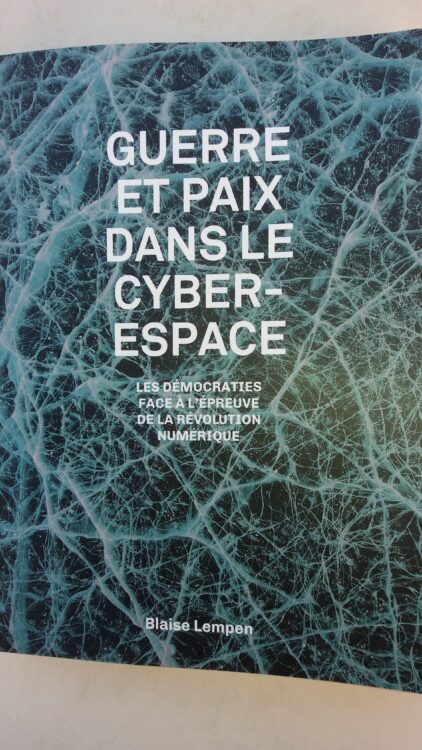A l’occasion de la Geneva Peace Week 2019 ICT4Peace aimerait rendre attentif au nouvel ouvrage de Blaise Lempen : “Guerre et Paix, dans le Cyberspace – Les Démocraties face à lépreuve de la révolution numérique”.
“La guerre mondiale pour la domination du cyberespace et du contrôle de l’Internet bouleverse la vie politique. Aux espoirs d’émancipation de l’Internet a succédé la contre-révolution numérique : désinformation, dérives sécuritaires et autoritaires, nouvelles formes d’espionnage, hypersurveillance, concentration des données, censure du Web” (Georg publisher, 282 pages, Geneva 2019).

Cyberespace – interview ict4peace
“Interview for ict4peace with the author of: “Guerre et Paix dans le Cyberespace – Les démocraties à l’épreuve de la révolution numérique” (Georg publisher, 282 pages, Geneva 2019).
Q. Blaise Lempen, “War and Peace in Cyberspace” is your 14th political essay. Explain your approach to us.
Blaise Lempen: this book is the result of 40 years of reflection. My first book, published in 1980, is entitled “Information and Power”. It goes without saying that this problem has not ceased to evolve. In 1987, I defended my doctoral thesis “Computer Science and Democracy” on the protection of personal data in the public sector. You can see that the subject is not new! In 2003, at about the same time when ICT4Peace published “Information and Communication Technologies for Peace” , I published “Democracy without borders”, a book inspired by the mobilization of anti-globalization movements on the Internet and in 2014 “Democracy in the Digital Age”, inspired by the Facebook revolution in the Arab springs.
Q.: But then what has changed?
Blaise Lempen: the work had to be put back on the job following three recent phenomena: the lightning rise of social networks in barely a decade, the new capacities for hypersurveillance of artificial intelligence and the rise of China, which is now in competition with the United States for the leadership of the digital world.
Q.: You say that democracies are on the defensive. Why?
Blaise Lempen: Yes, and that’s very worrying, because for less than ten years authoritarian regimes around the world have regained control of the Internet and are using information technology to spy, monitor and recruit. I sound an alarm in the face of the emergence of a new form of totalitarianism, a soft or high-tech totalitarianism, which is a threat to peace and freedom. China, Russia, Iran, Turkey and many other countries in Asia and Africa are censoring the Internet and social networks to the detriment of privacy, freedom of expression and association. These countries use the arsenal of cyber warfare to influence public opinion, including in democracies. This digital counter-revolution aims to stifle the emancipatory power of social networks. Orwell’s prophecies have come true.
Q.: What about democracies?
Blaise Lempen: they are not unscathed, due to the growing capacity to accumulate and transmit information. Abuses and breaches of privacy have increased. Intelligence and police services are not covered by the guarantees established by data protection legislation, which in turn is overtaken by the processing power of artificial intelligence.
Q.: So what can be done to preserve digital peace?
Blaise Lempen: the road to negotiating an international treaty, a Digital Geneva Convention, seems blocked, because the views of China, Russia, the United States and Europe are incompatible. The UN has been discussing these issues for several years without reaching an agreement. The high-level panel chaired by Melinda Gates and Jack Ma at the initiative of UN Secretary-General Antonio Guterres has just released a report on digital interdependence, but it has made only general recommendations. The UN Internet Governance Forum, which is meeting this month in Germany for its 14th edition, is a discussion forum, but has no decision-making power. The great digital powers want to keep their hands free. But Geneva has certainly a central role to play to gather all the stakeholders and prevent a digital war.
Q.: Can citizens mobilize?
Blaise Lempen: Yes, that is the appeal I am making and the objective of my book, an awareness of the threat that increasingly invasive technologies pose to our freedoms and world peace. We can react and we must react. The hope lies in the fact that we have never demonstrate in the streets so much, from Hong Kong to Paris (yellow vests), from Iraq to Chile, from Russia to Catalania. It is much easier to express yourself, to organize, to mobilize for a whole series of causes thanks to social networks. We must defend our freedoms, our democracies against both the abuses of multinational digital companies that concentrate data and wealth and those of authoritarian regimes that seek to suppress any critical opinion.
END”

